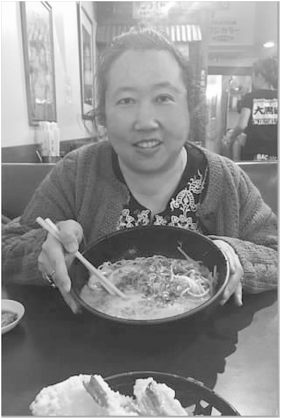Home
Our building housed old people
and Chinese immigrants, who worked as janitors,
butchers, seamstresses, and laundresses.
They hung their washing out their windows
to flutter dry. We entered our hotel through the dead-end
alley and took the elevator to our 2-room efficiency:
one bedroom — the size of an insignificant storage shed —
for the family and a small living room
and dining area with a mini-refrigerator.
My mother decorated the walls with calendars
she got for free from the chicken and duck markets.
Families shared a kitchen with one-stove they fought over
to cook their flank steak, cheap fish, and rice.
There was a neglected toilet on each floor
with never enough bath tissue. A squat vase
in the living room was the chamber pot for Lilien.
Mom, stolid and quiet, dumped the vase out
when there wasn't a 30-minute wait for the toilet.
She didn't want Lilien wandering down
the dark hall. The stairs seemed to lead nowhere
and we often heard Cantonese voices
yelling and then crying from somewhere.
I don't know how long we lived there
before moving back to Mason Street.
When I was six, my parents moved out
of the apartment they shared with my grandparents
and moved us into this residential hotel
on Vallejo Street, next to the police station
and above the Keystone Korner, a blues bar
that crackled into the early mornings.
Sometimes when my father asked about moving
back, my mother answered, I came to this country
because you promised a better life. I ended up
a maid who took care of your parents,
and then rushed out of the apartment in her raincoat.
My father, often fatigued from commuting
to the Richmond refinery, would tell us,
Your mother is running away
with the butcher, and he would put his face down
into his hands and cry. On weekends, my Uncle Carey
took me away from the brawl of sirens
and cherry lights, up the hill to see Grandma and Grandpa.
Grandma made her dense egg sponge cake that you needed
to wash down with a cup of hot tea
and served it with orange-swirled sherbet.
I don't know where Lilien was and didn't care.
I missed Grandma and sleeping in the bed next to hers.
One day I felt sick, my body shaking. My belly hurt
like someone pulled a belt too tight
around my waist, and I couldn't catch
my breath. The attacks happened
throughout the day for weeks. Visits to the doctor,
x-rays, and tests didn't get me well.
My mother sent for the old wise ladies
who shuffled into our bedroom.
They took my pulse, whispered that it was faint,
and nodded to my mother,
who pulled my blankets higher to comfort me.
One old grandmother placed her soft hands
on my face and asked me why
I wouldn't get well. I told her I wanted to go home.
Please take me home. I will die here.
and Chinese immigrants, who worked as janitors,
butchers, seamstresses, and laundresses.
They hung their washing out their windows
to flutter dry. We entered our hotel through the dead-end
alley and took the elevator to our 2-room efficiency:
one bedroom — the size of an insignificant storage shed —
for the family and a small living room
and dining area with a mini-refrigerator.
My mother decorated the walls with calendars
she got for free from the chicken and duck markets.
Families shared a kitchen with one-stove they fought over
to cook their flank steak, cheap fish, and rice.
There was a neglected toilet on each floor
with never enough bath tissue. A squat vase
in the living room was the chamber pot for Lilien.
Mom, stolid and quiet, dumped the vase out
when there wasn't a 30-minute wait for the toilet.
She didn't want Lilien wandering down
the dark hall. The stairs seemed to lead nowhere
and we often heard Cantonese voices
yelling and then crying from somewhere.
I don't know how long we lived there
before moving back to Mason Street.
When I was six, my parents moved out
of the apartment they shared with my grandparents
and moved us into this residential hotel
on Vallejo Street, next to the police station
and above the Keystone Korner, a blues bar
that crackled into the early mornings.
Sometimes when my father asked about moving
back, my mother answered, I came to this country
because you promised a better life. I ended up
a maid who took care of your parents,
and then rushed out of the apartment in her raincoat.
My father, often fatigued from commuting
to the Richmond refinery, would tell us,
Your mother is running away
with the butcher, and he would put his face down
into his hands and cry. On weekends, my Uncle Carey
took me away from the brawl of sirens
and cherry lights, up the hill to see Grandma and Grandpa.
Grandma made her dense egg sponge cake that you needed
to wash down with a cup of hot tea
and served it with orange-swirled sherbet.
I don't know where Lilien was and didn't care.
I missed Grandma and sleeping in the bed next to hers.
One day I felt sick, my body shaking. My belly hurt
like someone pulled a belt too tight
around my waist, and I couldn't catch
my breath. The attacks happened
throughout the day for weeks. Visits to the doctor,
x-rays, and tests didn't get me well.
My mother sent for the old wise ladies
who shuffled into our bedroom.
They took my pulse, whispered that it was faint,
and nodded to my mother,
who pulled my blankets higher to comfort me.
One old grandmother placed her soft hands
on my face and asked me why
I wouldn't get well. I told her I wanted to go home.
Please take me home. I will die here.
Priscilla Lee is the author of Wishbone and Chiu’s House of Lovely Animals: Confessional Poetry Written by a Ridiculously Funny Asian American Manic Depressive. Her poems have appeared in Ploughshares, The Kenyon Review, ZYZZYVA, Yellow as Turmeric, Fragrant as Cloves: A Contemporary Anthology of Asian American Women’s Poetry, and The Place That Inhabits Us: Poems of the San Francisco Bay Watershed. Her honors and awards include a Poetry Book Award from the Association for Asian American Studies, an Emily Chamberlain Cook Poetry Prize, and a James D. Phelan Literary Award from the San Francisco Foundation. She lives in San Francisco.
Powered by Women

